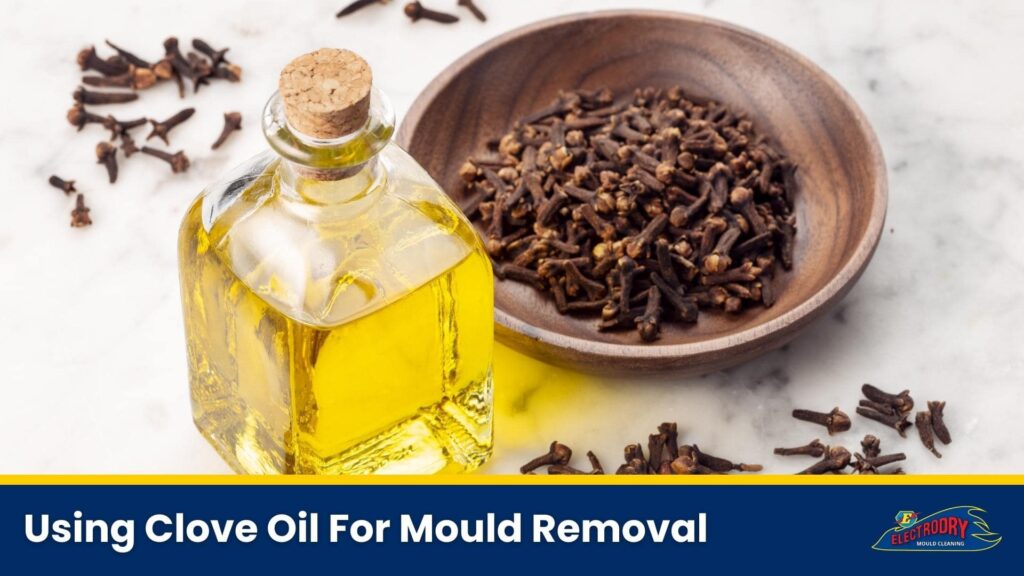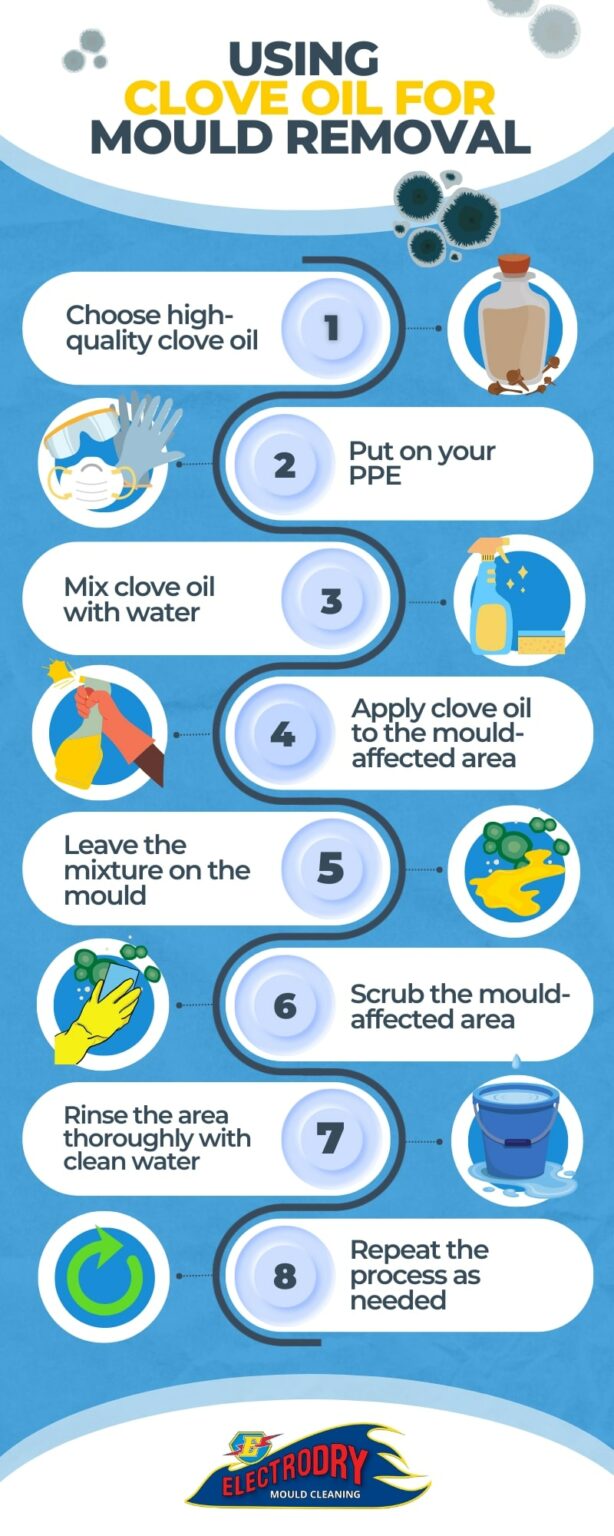10 Things to Know About
Using Clove Oil for Mould Removal

Dealing with mould in your home can be frustrating and potentially hazardous to your health. While there are many products available for mould removal, one natural solution that has gained popularity is using clove oil. Clove oil is known for its antifungal properties and can be an effective and eco-friendly way to tackle mould problems.
Using clove oil for mould removal can be a safe, natural, and effective way to remove mould in your home. However, it’s important to note that severe mould infestations often require professional services, such as Absolute Mould Removal’s affordable mould cleaning service in Perth.
What is Clove Oil?
Clove oil (aka, oil of cloves) is a natural essential oil derived from the buds of the clove plant, scientifically known as Syzygium aromaticum. For centuries, it has been used for its medicinal and therapeutic properties, including its effectiveness in killing mould.
Clove oil is known for its strong, spicy, pleasant aroma and is commonly used in aromatherapy and as a flavouring agent in food and beverages.
10 things to know about using clove oil for mould removal
Here are 10 things to know about using clove oil for mould removal.
Antifungal
Clove oil is a natural fungicide as it contains a compound called eugenol, which has powerful antifungal and antimicrobial properties. Eugenol works by disrupting the cell membranes of mould spores, causing them to break down and die. In this way, clove oil can effectively kill mould and prevent its growth. Moreover, clove oil helps to inhibit mould regrowth, providing long-lasting protection against fungi and mould.Eco-friendly
Unlike many chemical-based mould removal products, using clove oil to kill mould is an environmentally friendly and biodegradable choice, as it is derived from natural sources and doesn’t release harmful chemicals into the air or water. However, it can be dangerous if ingested, so keep it away from children and pets.You’ll need PPE
Clove oil can be a great natural alternative to bleach and other chemical-based mould removal products, however, that does not mean you should throw caution to the wind. To protect your skin, eyes and lungs while dealing with clove oil, you must wear personal protective equipment (PPE) like gloves, goggles, and an N95 face mask. Clove oil can irritate the skin and cause allergic reactions or respiratory problems in people who are sensitive to it.Cost-effective
Clove oil offers a cost-effective solution that is widely accessible and affordable. It can be purchased easily at health stores, pharmacies, and online retailers. While pure clove oil can be relatively expensive, a little goes a long way, making it a cost-effective option for mould removal. For example, mix a ¼ teaspoon of clove oil with two cups of water for mould removal, and this mixture should last for a few months.Multiple uses
In addition to its antifungal properties, clove oil also has antioxidant, anti-inflammatory, and analgesic properties. Moreover, clove oil can be effective against different types of mould, including black mould and mildew. This multipurpose essential oil can also for other cleaning purposes, such as disinfecting surfaces and eliminating odours. Clove oil can even be used as a natural insect repellent.Dilution and timing are key
Clove oil must always be diluted, as it can be potent and may irritate the skin and mucous membranes. Pure clove oil can also damage surfaces, so it’s best to use with caution. You can dilute clove oil with carrier oils like coconut or jojoba oil, but for cleaning purposes, we recommend diluting with water.When it comes to timing, clove oil does take longer to work. Whereas commercial mould cleaning products usually need a few minutes to work, clove oil needs to stay on surfaces for at least an hour. Some surfaces may even benefit from leaving the clove oil to work overnight for up to 24 hours. This extra time allows the clove oil to penetrate the mould and break down its structure. Clove oil also requires repeated applications and diligent scrubbing to fully eradicate the mould.
Clove oil on porous surfaces
Clove oil may not be suitable for all porous surfaces, such as drywall, as it may penetrate too deeply and cause damage; however, it can be used on leather. Clove oil can also cause discolouration on certain materials, so it’s important to test it on a small, inconspicuous area first.Clove oil on non-porous surfaces
Clove oil can be used as a mould remover on a variety of non-porous, hard surfaces, including painted walls, tiles, glass, vinyl, ceramic, plastic, fabrics, and kitchen and bathroom surfaces. However, clove oil can leave behind a yellowish stain on some surfaces, so it’s always a good idea to test it on a small area first to ensure it doesn’t cause any damage or stains. Notably, clove oil should not be used on marble or polymarble, as it will damage these surfaces.Safety precautions
Clove oil should not be used during pregnancy, breastfeeding, or by individuals with certain medical conditions. According to Healthline, clove oil should never be ingested as this can result in breathing problems, irritation in the airways and stomach, as well as diarrhoea. It’s highly unlikely that you’ll ingest any clove oil when cleaning mould, but children and pets may accidentally consume it, so it’s best to keep clove oil far away from these vulnerable loved ones.Because of clove oil’s strong, distinct aroma, it’s important to make sure that the area is very well-ventilated. Some people may also find this scent overpowering and unpleasant. Open doors and windows and use fans to help disperse any strong odours and fumes.
Remember to wear your PPE, and protect your eyes! When applying or handling clove oil, be careful to avoid contact with your eyes. If contact occurs, rinse your eyes thoroughly with clean water. Some sources also suggest rinsing your eyes with clean water for at least 10 minutes. If the irritation persists, seek medical attention from a healthcare professional as soon as possible.
It’s also important to note that clove oil should be stored in a cool, dry place away from direct sunlight to maintain its potency and quality.
Easy application
Using clove oil for mould removal is simple. Basically, all you need to do is dilute it, apply it to the affected area using a spray bottle or cloth, and let it sit for at least an hour before wiping it away.
Our step-by-step guide on using clove oil for mould removal

- Choose high-quality clove oil from reputable brands to ensure its effectiveness. Look for oils that are 100% pure and obtained through steam distillation or cold pressing methods.
- Before applying clove oil, put on your PPE, and clean the mould-affected area. Use a microfiber cloth with mild detergent or white vinegar and bicarb solution to remove any visible mould and dirt. This allows the clove oil to penetrate and work effectively. You may also want to add a few drops of tea tree oil to your vinegar and bicarb mould cleaning solution to take advantage of its antifungal prowess.
- Mixing ratio: To create a mould-fighting solution, mix a ¼ teaspoon of clove oil with one litre of water. This concentration is effective in killing mould spores.
- Apply the diluted clove oil directly to the mould-affected area. You can use a spray bottle or a clean cloth soaked in the mixture. Ensure complete coverage of the mould-infested surface, but make sure the surface is not excessively wet.
- Leave the mixture on the mould for a few hours or overnight. This allows clove oil’s antifungal properties of clove oil to kill the mould and inhibit its regrowth.
- Scrub the mould-affected area with a brush or sponge to remove any remaining mould residue.
- Rinse the area thoroughly with clean water.
- Repeat the process as needed. Some stubborn mould infestations may require multiple applications of clove oil to completely eliminate the problem.
The best way to remove mould is to prevent mould growth in the first place. Mould needs moisture to grow, so it’s important to address the cause of the mould growth, target any underlying moisture issues in your home, control high humidity and excessive condensation issues, ensure proper ventilation, and fix leaks.
If you’re looking for professional assistance and mould remediation services to remove the mould in your home, call our helpful Absolute staff at 1300 902 362 or book online.
